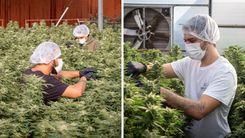“It is important that the compounding pharmacy has access to all cannabis inputs" argues Marco Fiaschetti, from Anfarmag
With the revision of RDC 327/2019, compounding pharmacies gain space in the discussion on medicinal cannabis
Published on 08/25/2025

Marco Fiaschetti Executive Director of the National Association of Magistral Pharmacists (Anfarmag). Image: Sechat Archive
The revision of RDC 327/2019, which establishes criteria for the manufacturing, commercialization, and prescription of cannabis-based products in Brazil, has been one of the central themes in the discussions of the cannabis sector. The draft revision has divided opinions, especially regarding the compounding in pharmacies of medicinal products with an active pharmaceutical ingredient derived from cannabidiol (CBD) purified.
During the 4th edition of the Brazilian Medicinal Cannabis Congress, Marco Fiaschetti, executive director of the National Association of Magistral Pharmacists (Anfarmag), celebrated the opening of this possibility. “It is important that the compounding pharmacy has access to all inputs, acquired from qualified suppliers, prioritizing quality,” he stated.
However, Fiaschetti warned about the restriction to the use of only pure CBD. “Restricting the magistral activity to a certain type of complex within cannabis [cannabidiol] will not meet the needs of patients, besides infringing on the freedom of those who decide on the type of treatment and prescription of these products: the prescribing professionals,” he said in an interview with Sechat.
Watch the interview with Marco Fiaschetti:
Legal victories amidst the debate
Recently, two compounding pharmacies obtained judicial authorization to compound cannabis-based medications, without the risk of sanctions from local health authorities. Among them is the Ephiciência pharmacy, one of the pioneers in Brazil working with cannabidiol formulations.
With this decision, the company can now also work with a wider variety of phytocannabinoids, in concentrations higher than those currently allowed in the magistral sector.
Fiaschetti believes that individualized treatments need to be at the center of the debate, as they ensure that each patient receives the most suitable therapy. In this context, compounding pharmacies play a fundamental role, as they allow for the customization of formulas and expand access to safe and effective cannabis-based therapies.








